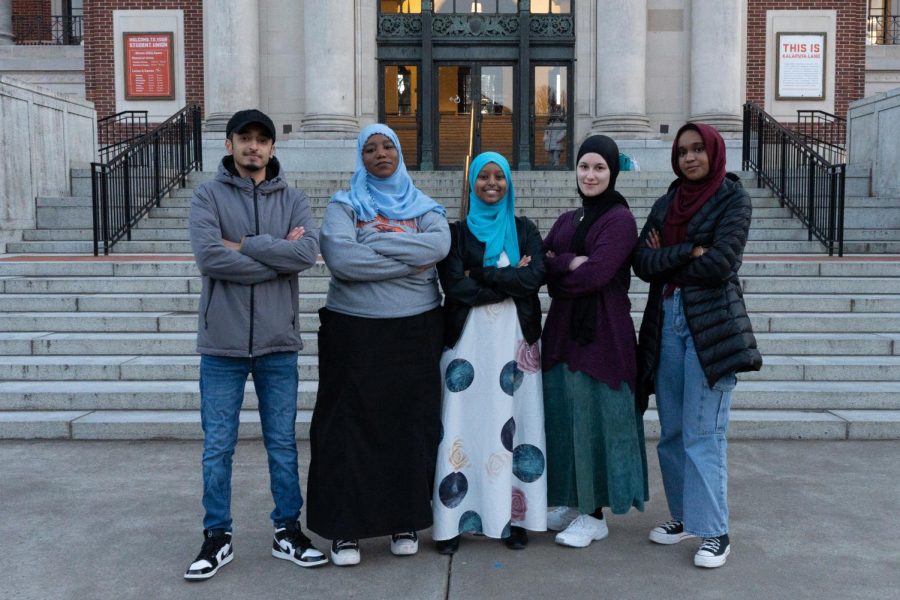The Revival of the Muslim Student Association
Vice President Abdullah Bedywi (left; he/him), President Fatima Rashid (she/her), Committee Chair Anisa Ali (she/her), Treasurer Denna Alnasser (she/her), Secretary Aya Ari (she/her) stand in front of the Memorial Union for a group photo on Feb. 24. The Muslim Student Association (MSA) dissolved in 2020 due to COVID-19 and has returned Fall Term 2022.
March 6, 2023
Like many clubs and organizations, the MSA pushed to work through the trials and tribulations that COVID-19 presented by doing periodic Zoom meetings, which consisted of five to six members, typically officers of the MSA. Eventually, due to the inability to gather and organize events as frequently, as well as the president at the time graduating, the MSA dissolved.
“I was interested in getting that community again,”said junior, and now President of MSA, Fatima Yassir Rashid.
Rashid began the process of reviving the club during spring of 2022 by reaching out to the former MSA President, Sadia Hasan for guidance on how to begin the club again.
“She gave me some tips and some information to the social media, the Muslim Student Association account on Ideologic,” Rashid said. “And she was like, ‘Okay, the club is yours. Do what you gotta do.’”
From here, Rashid posted on her Instagram, asking if anyone was interested in starting the MSA with her. She received a few responses, which then allowed for them to begin initial planning.
“I talked to our now Vice President, his name is Abdula. We had our first meeting and said, ‘What are we going to do?’” Rashid said. “We just outlined our plan and we didn’t really get events starting until, I believe week six of fall term.”
Rashid, who is originally from Illinois, said that finding a Muslim community when she first moved to Oregon was difficult, not even knowing if there was a Muslim community to join.
“Coming to OSU, trying to find that community was very crucial to me,” Rashid said. “Especially because these are people we can connect with, these are people with shared beliefs and we can definitely make more connections and friends that way.”
Rashid and members of the MSA are excited to be back and operating at the university and hope to see communities outside of OSU, and throughout the state of Oregon, incorporate their own MSA and create resources for those who might be interested in Islam or want to be better educated about Islam.
“I think, especially being a Muslim in America, that’s already a difficult place for some people to connect to,” Rashid said. “Having people that you know and are with you that understand you, especially in Oregon, which…I didn’t find super diverse when I first came here.”
Community is an important aspect of the club, especially as Ramadan approaches in March.
“Ramadan is a month of the Islamic calendar where Muslims fast from sunrise to sunset for 30 days,” said MSA Officer and Media Liaison, Anisa Ali. “The purpose of it is, it is one of the pillars of Islam. It is one of the ways to worship and look within yourself and take time to reflect, be one with yourself and connect with God and those around you. That’s why it’s very family based and people come together very often during this month.”
“We really want to have people know that at OSU there are still places that Ramadan can be celebrated together, especially because a lot of people aren’t with their families during school,” Rashid said.
The first three weeks of spring term, the MSA will be hosting weekly iftar, which is the dinner after breaking the fast, as well as speakers and Tahajjud, a late night prayer that OSU students are welcome to participate in, giving accessibility to those who may be unable to go to the Mosque.
Outside of Ramadan, MSA also holds weekly Friday prayers at the Asian and Pacific Cultural Center, for those who would like to attend Friday prayer but are unable to get to the Mosque due to their class schedule.
“I think it’s really impactful to have that resource available to Muslims and also to OSU students because this is an opportunity for other people who aren’t involved in Islam or don’t know that much about Islam, they can come to these events and enjoy and learn,” Rashid said.
The first weekly iftar will be held in the MU Ballroom. During the second week of Ramadan, iftar will be hosted in collaboration with the Ettihad Cultural Center.
“I think having Muslims, especially within their age group is super important to have that community,” Rashid said.
The third will be in collaboration with the Black Cultural Center, as Rashid hopes to revive the annual Malcolm X Solidarity.
Malcolm X Solidarity will have a keynote speaker who will talk about the impacts that Malcolm X had on the Muslim community, as well as the Black community.
“Islam and Muslims, sometimes, they’re really misunderstood. Sometimes I walk on campus and some people could be staring at me and I’m wondering, ‘What are they thinking? Are they curious?’” Rashid said. “I think having this is not only impactful to Muslim students to have that community, but for others to learn why we’re here and what we believe.











































































































